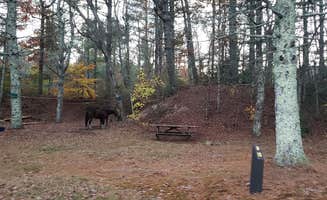Frog Hollow Horse Camp at Pachaug State Forest provides dedicated equestrian camping facilities approximately 35 miles southeast of Ellington, Connecticut. The terrain throughout the region consists primarily of rolling hills and mixed hardwood forests with numerous water features. Trail systems typically range from 800 to 1,200 feet in elevation with moderate changes suitable for most horse and rider combinations.
What to do
Trail riding on varied terrain: The surrounding area offers extensive trail networks across multiple state forests and management areas. At Wolf Den Campground, campers can access hiking paths directly from the campground. As one visitor notes, "Close to a small walking path and a larger intermediate hiking trail," making it convenient for morning rides without trailering.
Geocaching adventures: Several parks in the region maintain geocache locations that can be accessed on horseback or foot. "There's a small playground in the middle of the loop, a number of hiking trails throughout the park along with a few geocaches (download details for offline use as phone connection is spotty)," reports a Wolf Den camper.
Historical exploration: Some equestrian trails pass by preserved historical sites. Near Wolf Den, visitors can explore "a small brook with an old mill and blacksmith shop that is sometimes open on weekends for tours. It's a nice place to explore and have a picnic."
What campers like
Privacy between campsites: Equestrian campgrounds in the region typically offer good site separation. At Wolf Den, "the trees provide separation and some shade on largely open sites that tend to open up toward the back with open areas for pitching tents."
Night sky viewing: The low light pollution in these rural camping areas creates excellent stargazing conditions. As one Mashamoquet Brook camper describes, there are "Large open areas for kids and adults to play during day and star gaze at night."
Clean facilities: Despite the rustic nature of equestrian campgrounds, visitors appreciate well-maintained facilities. "Bathrooms were clean and staff were friendly. Would definitely stay again," reports a visitor to Mashamoquet Brook State Park.
What you should know
Site selection strategy: For more privacy at equestrian campgrounds, choose sites positioned toward the back of loops. At Wolf Den, "The ones toward the back of the loop back up toward the woods and give you some more privacy."
Seasonal limitations: Most equestrian campgrounds have defined operating seasons. Wolf Den operates from "May 26 to September 4," with limited water availability outside these dates.
Reservation requirements: While Frog Hollow operates on a first-come, first-served basis, other equestrian sites require advance planning. During peak periods at LeGrand Reynolds Horsemen's Camping Area, reservations are essential as the limited number of sites with hookups fill quickly.
Tips for camping with families
Playground accessibility: Several campgrounds feature play areas for children. Wolf Den includes "a small playground in the middle of the loop," allowing parents to monitor children while tending to horses.
Multi-activity options: Look for campgrounds with diverse recreational opportunities beyond riding. One visitor to Wolf Den noted the availability of "a swimming pond," though swimming availability may change seasonally.
Site spacing considerations: For family camping with horses, select sites with adequate room for both camping equipment and horse trailers. A visitor to Frog Hollow Horse Camp notes, "There's space for your camping gear as well as a trailer and horseline."
Tips from RVers
Length restrictions: Most equestrian sites have limited pad sizes. At Wolf Den, "Most sites are relatively short level pads, with little or no shade, but very pleasant. We picked site 33 for the best shade and longer pad."
Electric availability: Electric hookups are rare at primitive equestrian campgrounds. At Wolf Den, "Site 20 is the only one with electric," making advance reservation essential for RVers requiring power.
Site leveling: Prepare for various pad conditions. One RVer at Wolf Den found "the parking pads are paved and a few have overhanging branches," requiring careful positioning of larger rigs.


